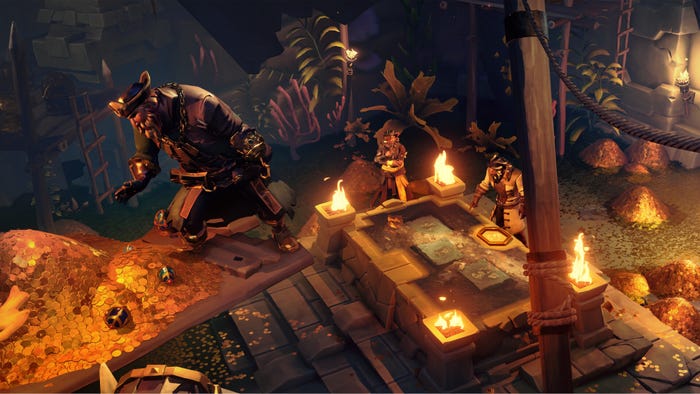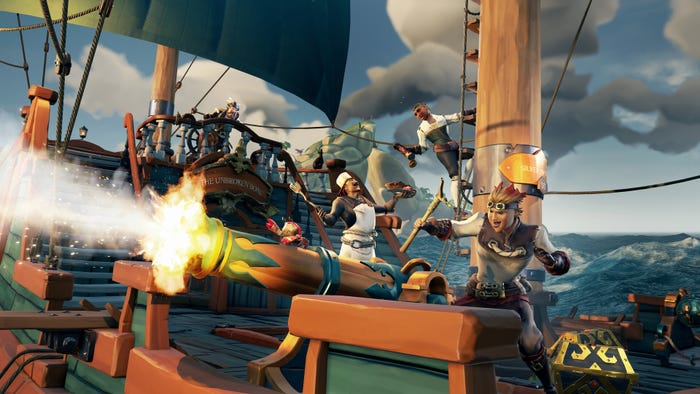Trending
Opinion: How will Project 2025 impact game developers?
The Heritage Foundation's manifesto for the possible next administration could do great harm to many, including large portions of the game development community.
Flix Interactive CEO John Tearle discusses the collaborative nature of co-development and leveraging its broad expertise on all decks.

As Sea of Thieves approaches its sixth anniversary, Rare’s online pirating adventure game is expanding its blue oceans following the announcement that it is making its way to PS5 in April. As part of Microsoft’s strategy to bring its games to more players, it’s not just about expanding the player base, with full cross-platform play, but also about giving a new lease of life to a now aging live-service title to ensure the community and the developers can continue sailing these high seas.
Much like the co-operative nature of getting a tight crew together, Rare didn’t achieve this success alone but with the support of other studios. The first of these was Flix Interactive, brought on as a co-developer about a year prior to the game’s launch. Since then, the Birmingham-based studio has continued being a sturdy shipmate in the game’s updates including introducing fire damage and physical ship damage, updates to the Captaincy system, as well as work on last year’s Monkey Island expansion.
The opportunity to work with Rare had first come with another Microsoft partnership, when Flix was brought on to support Sumo Digital with the long troubled development of Crackdown 3 (which would ship a year after Sea of Thieves). While it has developed broad expertise and specialty in Unreal, capable of end-to-end development, the real demand that Flix has been able to fill is as a co-developer.
“There are great games out there that people need either specialists for or to help bolster a team,” says Flix co-founder and CEO John Tearle. “Great customer service is the key to it, understanding how you can best work with those other partners in a way which is absolutely integrated as part and parcel of their team as best you possibly can be.”
With the huge scale of AAA development, it’s common for games to be made with the support of outsourcing and other development partners, though these companies typically do not take the spotlight. Tearle is however keen to distinguish Flix’s partnerships from outsourcing, where it’s more the case of being assigned a module of work to deliver, such as a map, lobby system, or art assets.
“Co-development is far more ingrained,” he says. “We work hand in hand with the team over at Rare with everything that they do. A lot of the design leadership turn around and actually work with our team on our side to be able to ascertain features, which can be anything from front facing through to infrastructure.”

Image via Rare/Microsoft.
It’s very much a collaboration where the Flix team is integrated with Rare’s, even though that will mean teams are divided into groups or subgroups to work on specific components, whether that be a specific feature or for optimization. “As games develop further and more responsibilities are given, Flix may end up becoming one of those component parts, just like a number of the other developers that Rare work with as well.” Meanwhile, its work with other client studios is sometimes just a case of following the brief to the letter.
“It's quite difficult to pick those parts and components out, but there were certain features that we've worked on with Rare across the spectrum on Sea of Thieves, some of it that was completely collaborative, or they have an idea and ask us to flesh it out,” says Tearle, while adding that nine times out of ten the team ultimately falls in line with the strong design leadership of Rare’s Mike Chapman and Shelly Preston.
“But what you tend to find is that they would gift some of that back to the team, if someone's got a great idea. That's the way that all of the best games are made: finding people that are really good at doing their job, and then getting the responsibility to do that. On the flip side, we can go back to them and say we're not sure of the creative vision with some of this, they would then help redefine it or turn around and actually steer us in the right direction.”
For instance, introducing fire damage was one component the Flix team took more ownership of. “But even then, we had a fantastic rendering engineer that we've worked with on their side to make sure that things were really efficient, running on older tech like the original Xbox One,” says Tearle. “There would be some creative input from our side, there'll be a lot of creative input and direction from their side as well. It's basically like working as part of an extension of that arm.”
Of course, the ingredients of being a strong co-developer means having the expertise that meets the studio’s needs in the first place. Flix prides itself as an Unreal specialist, core for so much of AAA development, but Tearle and company co-founder Lee Snookes had also developed with backend infrastructure service systems and setups in a corporate software development context, back when the team’s experience with games was more of a “mod team or indie mentality”.
“There's a lot of boring side to games that no one knows about that actually gives you a leg up into that area,” Tearle explains. “A lot of game teams have issues with funding then turn around to try co-development, but the problem is there's a huge amount of other sub-components when you're working in AAA, like working with hundreds of other games developers and how you manage that, changing production policies to match what they do. All these things we have to consider but we’ve done that because of our expertise outside of games prior.”

Image via Rare/Microsoft.
Where it might find itself lacking the necessary expertise, for example particle effects support, Tearle explains they’ll still have other partners within their network that they can take it to. “That's what being a great co-development partner is, making sure that you look for the right expertise and then ended up delivering on those features.”
With its tightly knit team (or “band of brothers”, as Tearle puts it) that’s also seen a high retention since the beginning, Flix has amassed and maintained a lot of inherent knowledge, from bizdev to backends, as well as being able to optmimize for the latest and older hardware, which has in turn served it well in supporting other games, such as Rebellion’s Sniper Elite 5 and Zombie Army 4 and Team 17’s Hell Let Loose.
“Some of these studios have got incredible game ideas, but then understanding how to execute and make them a commercial success, you have to have the actual technical expertise behind that, and that's what Flix brings to the table,” Tearle concludes. “At the same time, we do that with an attitude of complete support. It's about giving the best customer experience.”
By playing the strong support role to these AAA releases, Flix naturally doesn’t get to share the limelight, though one might think it’s very happy being the UK games industry’s best kept secret. But with its broad expertise and reputation accumulated for over a decade with a dedicated team, it’s brimming with potential should it decide to take the plunge and fly the flag with its own game ideas in the future.
You May Also Like